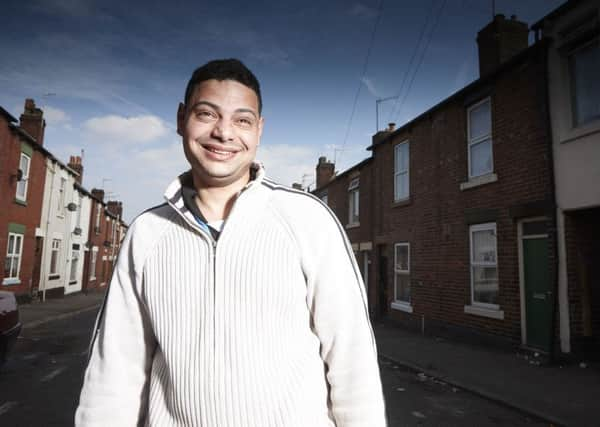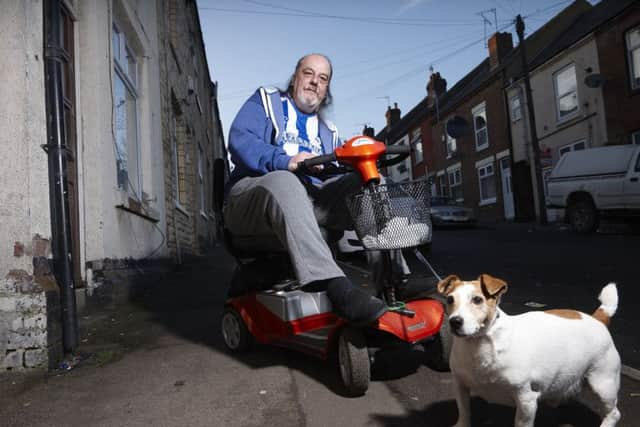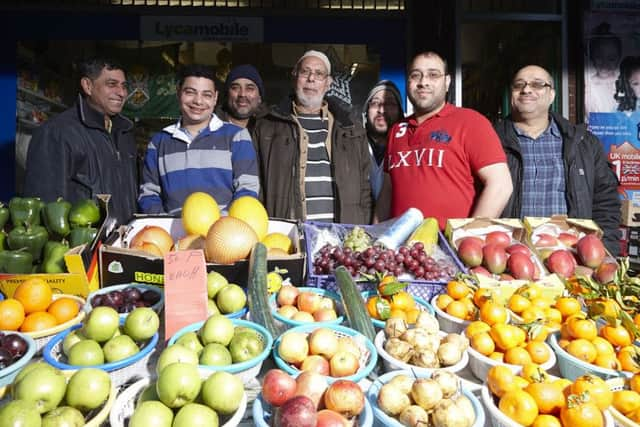Benefits Street producer defends his new show set in Yorkshire


A LITTLE over two years ago, when former home secretary and then Sheffield MP David Blunkett warned that the influx of Roma people to his home city risked causing an “explosion”, the national media poured in to see for themselves, filed their lurid reports of a community at breaking point and then promptly left again.
Not long afterwards, the cameras moved in. The tinderbox environment of Page Hall in the east of the city, one of the most deprived areas in Britain, was identified by the makers of controversial documentary series Benefits Street as the perfect place to now chart Britain’s continued struggle with the thorny issue of immigration.
Advertisement
Hide AdAdvertisement
Hide AdIt isn’t difficult to see why. Page Hall’s tightly packed streets of terraced houses were once home to a predominantly white working-class community. During the 1960s and 70s migrants from the Pakistani controlled area of Kashmir came here and thrived, owning properties, shops and restaurants.


Over the past five years more than 1,500 Roma migrants from Slovakia have moved into Page Hall, hoping to build the sort of prosperous lives for themselves that previous generations of immigrants now have.
The resulting culture clash has raised concerns of a repeat of the race riots which engulfed Bradford, Oldham and Burnley in the summer of 2001. Complaints centre on the Roma’s maddeningly anti-social habits. They congregate outside in large groups late into the night, the adults talking – and sometimes fighting – the children shouting, smoking and kicking footballs against the walls of houses.
The streets are filled with litter, the police seem unable to cope, while longstanding residents both white and Asian complain that their arrival means there are no places left at local school and they are unable to get an appointment at the doctor’s or dentist.
Advertisement
Hide AdAdvertisement
Hide AdIt is into this maelstrom of racial tension that the makers of Keeping Up with the Khans, a new four-part documentary series which starts on Channel 4 tonight, placed themselves and their cameras for 15 months.


Each episode in the series focuses on a different community living in Page Hall: Refugees; Roma migrants; the Pakistani and white British communities. Tonight, in episode one, we meet refugees fleeing war to seek asylum in Britain who are battling red tape as they try to start a new life.
Haider from the Lebanon, Libyan Ehab, Cameroonian political dissident Pride, and Omar from the Sudan live together in a house rented by the Home Office. They are all in limbo, unable to work or study while they wait anxiously to hear if their request for asylum has been granted.
Kieran Smith, the show’s executive producer, says Page Hall was picked because it is an area that has been historically transformed by immigration while also having a present day immigration story to tell. As such, he says, “it felt like the perfect place to look at how communities and people live side by side given the changes in the neighbourhood over the last 60 years”.
Advertisement
Hide AdAdvertisement
Hide AdHis company, Love Productions, has tried to make this programme before. Immigration Street, a follow-up to Benefits Street set in Southampton, ran for just one episode and saw local residents angrily object to the crew’s presence. Smith insists they left because of threats from local criminals, but many will be concerned that Keeping Up with the Khans will only serve to stigmatise Sheffield and the community it portrays.


Smith doesn’t see it that way. The point, he says, as with Benefits Street, is to hold up a mirror to modern Britain.
“When we make documentaries our motivation, unlike reality television, is not to make people stars but to show the reality of life for people in these places. It’s about what as a society is our responsibility to people who want to come and live here, to work here and call the UK their home. And when they do come how are they received and how do they get on in society?
“These are huge, quite often polarising issues but they’re really important ones and ultimately what television should be discussing.”
Advertisement
Hide AdAdvertisement
Hide AdDuring filming he came to admire the way Page Hall managed to achieve a sense of community and cohesion, despite being an area which has seen substantial economic decline. “But it does have problems,” he adds quickly. “I’m not pretending it doesn’t. There are people living there who do feel they’ve been abandoned by successive governments and successive councils and who aren’t listened to. And we felt it was important to reflect that.


“I don’t think we’ve glossed over the issues or what the problems are. If you follow the series through you will clearly see there are groups people who feel they’ve been abandoned, there is animosity between groups of people.
“But likewise I’m not in the game of simply saying ‘immigration’s a problem, these people can’t deal with it and isn’t it terrible?’ because that’s not the truth either. A large number of people living in Page Hall get on with their lives, get on with their jobs, socialise with their neighbours and for them the fact that people are coming from other countries is not a problem or an issue for them.”
Smith acknowledges there was a responsibility to fairly and accurately reflect what was filmed over the course of the 15 months that the cameras were there. To that end, each of the series’ main contributors has been shown the programmes before they go out. “We say ‘listen, watch this, is this fair? Is this an accurate representation of your life and what we have filmed with you?’ If someone turned round and said ‘absolutely it isn’t’ then we’d have some explaining to do, but we haven’t had that reaction.”
Advertisement
Hide AdAdvertisement
Hide AdOne of those main contributors is local businessman Wahid Nazir. Prepared to give the Roma a chance, he employs two of them in his fast food restaurant and praises their work ethic. Viewers will see him help one, aspiring singer Erik, audition (gloriously unsuccessfully) for Britain’s Got Talent after belting out Celine Dion hits while washing up.
“I think these people have been able to make a go of it because of the area,” he says. “If it was any other area and there was that saturation of EU migrants there would have been a lot more trouble than there is in Page Hall.
“They’ve been very tolerant, very supportive and very patient to be honest with you, because a lot of the habits these people have aren’t very sociable.”
He hopes Keeping Up with the Khans will tell the true story of Page Hall – both good and bad. The two episodes he has seen so far encourage him that the portrayal of the area will be an accurate one. And he sees some hope.
Advertisement
Hide AdAdvertisement
Hide Ad“Things are slightly improving, not as much as they should, but it’s starting to calm down. They’ve got a culture, fair dos, but everyone’s got a culture. You can’t force yourselves on other people, but they’re learning.”
Keeping Up with the Khans starts on Channel 4 tonight at 9pm.
Its controversial predecessor...
First aired in January 2104, Benefits Street revealed the reality of life on one of Britain’s most deprived streets – James Turner Street in Winson Green, Birmingham.
Dubbed “poverty porn” by critics, others defended it as a touching insight into the lack of hope and opportunity that blights entire communities in modern Britain.
Advertisement
Hide AdAdvertisement
Hide AdIt showed benefits claimants committing crimes, including a demonstration of how to shoplift, and portrayed many as being dependent on welfare payments and lacking the motivation to find work.
The show triggered hundreds of complaints and an investigation by media regulator Ofcom. It was mentioned in the House of Commons, and prompted political debate on the issue of welfare.